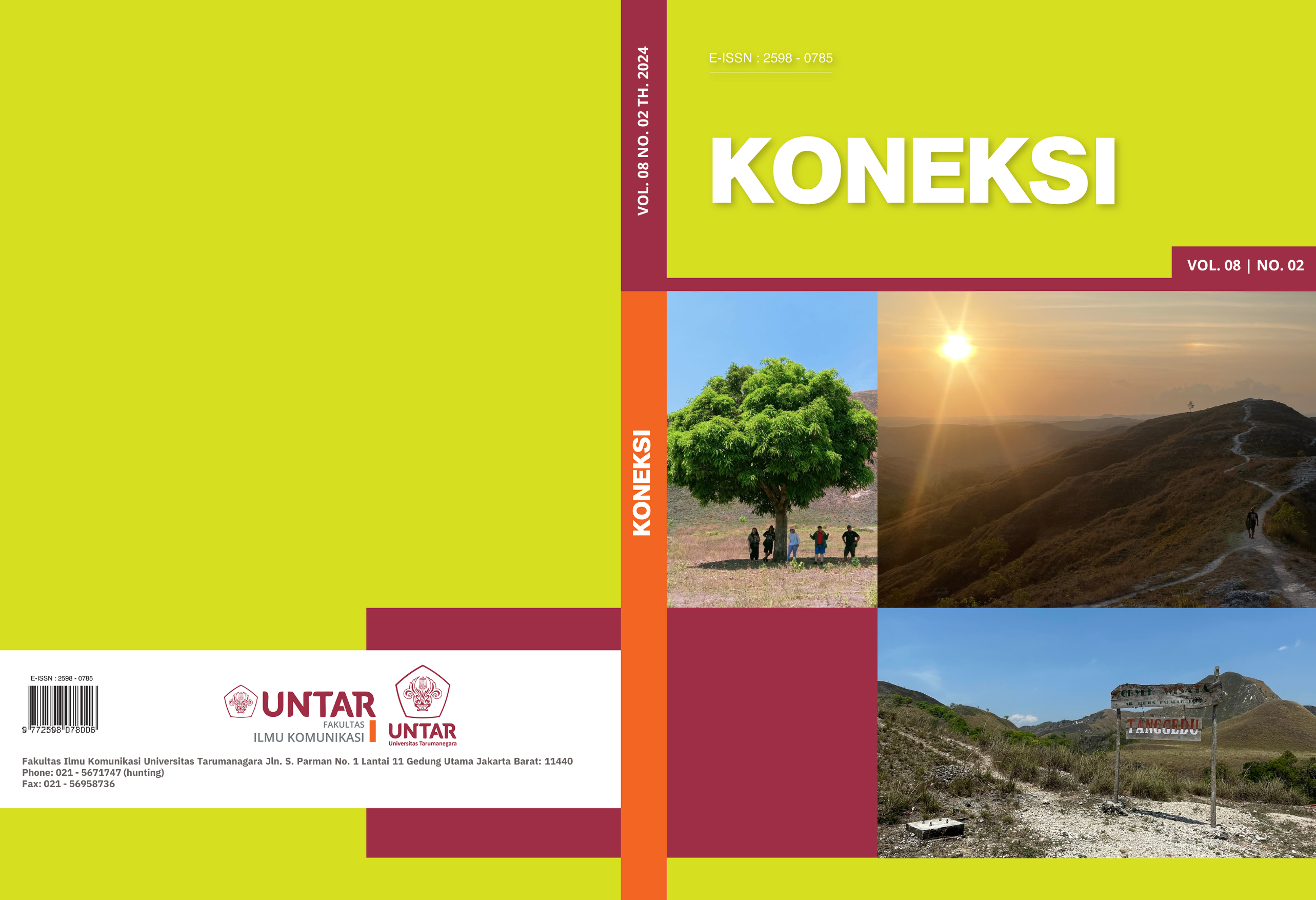Mask Girl: Wacana Kritis Sara Mills terhadap Kecantikan Perempuan yang Terstandarisasi
Main Article Content
Abstract
Korean drama is one of the Korean wave outputs that is increasingly popular around the world. One of the Korean dramas that has recently become a topic of discussion among the public is Mask Girl. This drama tells the story of a talented woman who, since childhood, has been treated badly by her environment because of her physical appearance, which is considered not in accordance with South Korean beauty standards. This research aims to find out how female beauty is standardized and constructed by Korean society. With a qualitative approach to phenomenological methods, this study is analyzed using Sara Mills' critical discourse analysis with a focus on the position of subjects-objects and viewers through three main points: scenes, characters, and dialogues. The researcher interviewed one South Korean citizen, one Indonesian citizen living in South Korea, a watcher of the drama Mask Girl, and two female experts. The result of this research is that female beauty is still standardized and constructed by society. Women are called beautiful if they have a small face, double eyelids, a sharp nose, white skin, red/pink lips, and attractive breast size. As a result of the standardized beauty and construction by society, there is appearance discrimination and injustice in society.
Drama Korea merupakan salah satu hasil dari Korean wave yang semakin populer di seluruh dunia. Salah satu drama Korea yang menjadi topik perbincangan di kalangan masyarakat adalah drama Mask Girl. Drama ini menceritakan mengenai seorang perempuan berbakat bernama Kim Mo Mi yang sejak kecil menerima perlakuan buruk oleh lingkungan sekitar karena penampilan fisiknya yang dianggap tidak sesuai dengan standar kecantikan Korea Selatan. Penelitian ini ingin mengetahui dan menujukkan bagaimana kecantikan seorang perempuan distandarisasi dan dikonstruksikan oleh masyarakat Korea. Dengan pendekatan kualitatif metode fenomenologi, analisis wacana kritis Sara Mills digunakan sebagai teknik analisis data dengan fokus pada posisi subjek-objek dan penonton melalui tiga poin utama yaitu adegan, karakter dan dialog. Penulis mewawancarai satu warga Korea Selatan, satu warga Indonesia yang tinggal di Korea Selatan, penonton drama Mask Girl dan dua ahli kajian media kritis. Hasil dari penelitian ini adalah kecantikan perempuan sampai saat ini masih terstandarisasi dan dikonstruksi oleh masyarakat. Perempuan dianggap cantik jika memiliki wajah yang mungil, kelopak mata ganda, hidung mancung, kulit putih, bibir berwarna merah atau merah muda dan tubuh yang langsing dengan ukuran payudara yang menarik. Akibat kecantikan yang terstandarisasi oleh masyarakat tersebut, terjadilah diskriminasi penampilan dan ketidakadilan yang dialami oleh perempuan yang tidak memenuhi standar kecantikan dalam kehidupan bermasyarakat.
Article Details

This work is licensed under a Creative Commons Attribution-ShareAlike 4.0 International License.
This work is licensed under a Koneksi Creative Commons Attribution-ShareAlike 4.0 International License.References
Aprilianty, S., Komariah, S., & Abdullah, M. N. A. (2023). Konsep Beauty Privilege Membentuk Kekerasan Simbolik. IDEAS, 9 (1). https://doi.org/10.32884/ideas.v9i1.1253
Aryustin, E., & Christin, M. (2022). Sara Mills Model Critical Discourse Analysis on the Peaky Blinders Serial. Budapest International Research and Critics Institute-Journal (BIRCI-Journal), 5 (3). https://doi.org/https://doi.org/10.33258/birci.v5i3.6644
Azeharie, S. (2023). Cultural Proximity of Korean and Indonesian in Korean Dramas. WACANA: Jurnal Ilmiah Ilmu Komunikasi, 22 (1). https://doi.org/https://doi.org/10.32509/wacana.v22i1.2440
Chong, J. (2023). Whiteness as Beauty A critical analysis of South Korean tone-up cream and sunscreen advertorials. Spectrum, 10.
Dihni, V. A. (2022). Mengapa Orang Indonesia Suka Nonton Drakor? Ini Alasannya. Databoks.Katadata.Co.Id. https://databoks.katadata.co.id/datapublish/2022/08/30/mengapa-orang-indonesia-suka-nonton-drakor-ini-alasannya
Eriyanto. (2017). Analisis Wacana (Pengantar Analisis Teks Media). PT LKiS Pelangi Aksara.
Eunice. (2023). K-Drama “Mask Girl” Is Currently 2nd Most Popular TV Shows On Netflix Worldwide. Kpopmap.Com. https://www.kpopmap.com/k-drama-mask-girl-is-currently-5th-most-popular-tv-shows-on-netflix-worldwide/
Hartutik, & Sayuti, S. A. (2023). Sexual Harassment in News Gender Violence in Tempo.co Media and Newsroom Narratives (Sara Mills Critical Discourse Analysis). Britain International of Linguistics, Arts and Education (BIoLAE), 5 (2). https://doi.org/https://doi.org/10.33258/biolae.v5i2.910
Jannah, P. M. (2021). Pelecehan Seksual, Seksisme dan Bystander. Psikobuletin:Buletin Ilmiah Psikologi, 2 (1). https://doi.org/10.24014/pib.v2i1.12023
Joyce, J. B., Huma, B., Ristimaki, H.-L., Almeida, F. F. de, & Doehring, A. (2021). Speaking out against everyday sexism: Gender and epistemics in accusations of “mansplaining.” Feminism & Psychology, 3 (4). https://journals.sagepub.com/doi/pdf/10.1177/0959353520979499
Kasih, M. K. Al. (2022). Studi Feminisme: Pengaruh Ketidakadilan Gender Terhadap Pelecehan Seksual Mahasiswi di Surabaya. Prosiding Konferensi Nasional Gender Dan Gerakan Sosial, 1 (1). http://proceedings.radenfatah.ac.id/index.php/kggs
Kemenpppa. (2023). Kekerasan Seksual di Indonesia. Kemenpppa.Go.Id. https://kekerasan.kemenpppa.go.id/ringkasan
Kiranantika, A. (2022). Memahami Interseksionalitas Dalam Keberagaman Indonesia: Tinjauan dalam Sosiologi Gender. Indonesian Journal of Sociology, Education and Development, 4(1). https://doi.org/https://doi.org/10.52483/ijsed.v4i1.77
Park, J. H., Kim, K. A., & Lee, Y. (2023). Theorizing the Korean Wave| Netflix and Platform Imperialism: How Netflix Alters the Ecology of the Korean TV Drama Industry. International Journal of Communication, 17, 81. https://ijoc.org/index.php/ijoc/article/view/18468/3985
Rekha, & Manjula. (2022). Rewriting Women: A Critique of Misogyny, Structure and Agency in the Novels of K. R. Meera- A Review. SRINIVAS PUBLICATION, 7 (2). https://doi.org/10.5281/zenodo.7041481
Rusyidi, B., Bintari, A., & Wibowo, H. (2019). (Experience And Knowledge On Sexual Harassment: A Preliminary Study Among Indonesian University Students). Social Work Journal, 9 (1). https://doi.org/https://doi.org/10.24198/share.v7i2.15723
So, W. (2020). Share of respondents who have had plastic surgery in South Korea in 2020, by age and gender. Statista. https://www.statista.com/statistics/1111220/south-korea-plastic-surgery-experience-by-age-and-gender/
Yoon, L. (2023). Rate of sexual assaults in South Korea from 2008 to 2021. Statista. https://www.statista.com/statistics/1232139/south-korea-sexual-assault-rate/#statisticContainer



